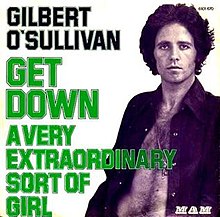
Gilbert O'Sullivan is an Irish singer-songwriter. O'Sullivan experienced success during the early 1970s with songs including "Alone Again (Naturally)", "Clair" and "Get Down". O'Sullivan's songs are often marked by his distinctive percussive piano playing style and observational lyrics using wordplay.

"Daniel" is a song written by English musician Elton John and songwriter Bernie Taupin, and performed by John. It was first released on John's 1973 album Don't Shoot Me I'm Only the Piano Player.

"Touch Me in the Morning" is a song recorded by Diana Ross on the Motown label. It was written by Ron Miller and Michael Masser, and produced by the latter and Tom Baird. It was released on May 3, 1973 as the first single from her album of the same name. In 1973, it became Ross's second solo No. 1 single on the Billboard Hot 100.

"The Show Must Go On" is a song co-written by Leo Sayer and David Courtney and first recorded by Sayer. It was released in the United Kingdom in 1973, becoming Sayer's first hit record. The song reached #3 on the Irish Singles Chart in January 1974, and was included on Sayer's debut album Silverbird.

"Laughter in the Rain" is a song composed and recorded by Neil Sedaka, with lyrics by Phil Cody. It includes a 20-second saxophone solo by Jim Horn.
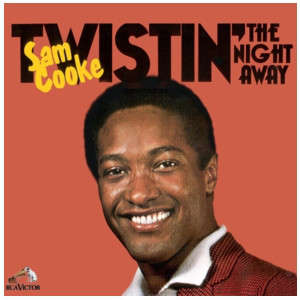
"Twistin' the Night Away" is a song written and recorded by Sam Cooke. It was recorded on 18 December 1961 and released as a single in 1962. It became very popular, charting in the top ten of both the Billboard Hot 100 (#9) and Billboard's R&B chart (#1). "Twistin' the Night Away" was successful overseas as well, peaking at #6 on the UK Singles Chart.

"Too Much, Too Little, Too Late" is a song performed by singers Johnny Mathis and Deniece Williams. Lyrics and music were arranged by Nat Kipner and John Vallins. The single was a comeback of sorts for Mathis as his last U.S. top 10 hit was 1963’s "What Will Mary Say" and his last U.S. #1 hit was 1957's "Chances Are."

"Clair" is a song by Gilbert O'Sullivan, released in 1972 as the first single from his second album Back to Front. It was written by O'Sullivan and produced by Gordon Mills, and is one of O'Sullivan's biggest-selling singles.

"Shadow Dancing" is a disco song performed by English singer-songwriter Andy Gibb. The song was released in April 1978 as the lead single from his second studio album of the same name. The song reached number one for seven consecutive weeks on the Billboard Hot 100 in 1978. Albhy Galuten arranged the song with Barry Gibb. While Andy Gibb would have three more Top 10 hits in the U.S., this would be his final chart-topping hit in the United States. The song became a platinum record.

"Alone Again (Naturally)" is a song by Irish singer-songwriter Gilbert O'Sullivan. Recorded in 1971, it became a worldwide hit featuring on his second studio album Back to Front.

"More Love" is a 1967 hit single recorded by the American soul group The Miracles for Motown Records' Tamla label. The single, included on the group's 1967 album Make It Happen, later reissued in 1970 as The Tears of a Clown. Kim Carnes's 1980 cover of the song reached the Top 10 of Billboard's Adult Contemporary and Hot 100 charts.
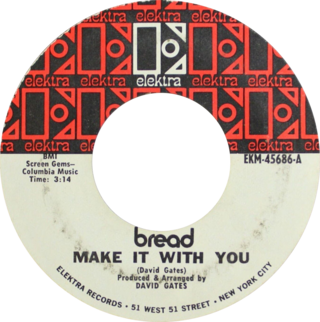
"Make It with You" is a song written by David Gates and originally recorded by American pop-rock group Bread, of which Gates was a member. Gates and drummer Mike Botts are the only members of the group to appear on the recording which was a No.1 hit.

"Show and Tell" is a popular song written by Jerry Fuller and first recorded by Johnny Mathis in 1972. This original version made it to #36 on the Easy Listening chart.
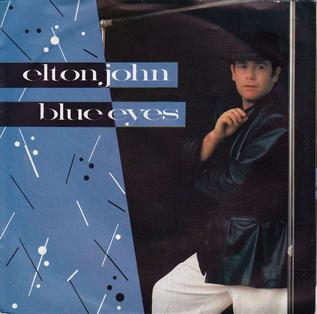
"Blue Eyes" is a song performed by English musician Elton John with music and lyrics written by John and Gary Osborne. It was released in 1982, as the UK lead single from John's 16th studio album, Jump Up! (1982). It was released as the album's second single in the US. It hit No. 8 in the UK; in the US, it spent three weeks at No. 10 on the Cash Box chart, went to No. 12 on the Billboard Hot 100, and spent two weeks at No. 1 on the Billboard AC chart. John performed this song often in his concerts until 2012.

"Keep on Singing" is a 1973 song composed by Danny Janssen and Bobby Hart, and was originally recorded by Austin Roberts from the album Austin Roberts. It was released as a single on Chelsea Records and reached No. 50 on the U.S. Billboard Hot 100 and No. 39 on the Cash Box Top 100. In Canada it reached # 79. "Keep on Singing" was best known as a hit single by Helen Reddy in 1974.

"Lonely Night (Angel Face)" is a song written by Neil Sedaka. The song was first recorded by Sedaka and appeared as a track on his 1975 studio album, The Hungry Years. The following year the song was made popular when covered by the pop music duo Captain & Tennille, who took their version to number 3 on the Billboard Hot 100.

"Never My Love" is a pop standard written by American siblings Don and Dick Addrisi, and best known from a hit 1967 recording by the Association. The Addrisi Brothers had two Top 40 hits as recording artists, but their biggest success as songwriters was "Never My Love". Recorded by dozens of notable artists in the decades since, in 1999 the music publishing rights organization Broadcast Music, Inc. (BMI) announced it was the second most-played song on radio and television of the 20th century in the U.S.
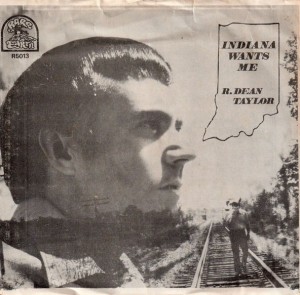
"Indiana Wants Me" is a song written, composed, and originally recorded by Canadian singer-songwriter R. Dean Taylor. It was released on the Rare Earth label, a subsidiary of Motown Records, in 1970, and was a top ten hit in both the US and UK. In Cashbox magazine, the single hit #1. The song spent two weeks at #2 in Canada.
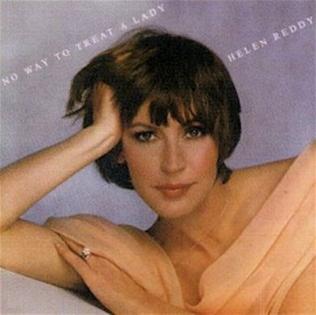
"Ain't No Way to Treat a Lady" is a 1974 written and first recorded by American singer-songwriter Harriet Schock. It was covered by various other artists, and saw its greatest success when it was covered by Helen Reddy, whose 1975 rendition became a top 10 hit.

I'm a Writer, Not a Fighter is the third studio album by Irish singer-songwriter Gilbert O'Sullivan, originally released by MAM Records in September 1973. After becoming one of the most successful performers worldwide in 1972, O'Sullivan pursued new directions with the album, taking influence from rock music and funk and incorporating an array of then-new electric keyboards, as well as emphasizing a new rhythmical focus. The album was recorded "on and off" with producer Gordon Mills at the latter's studio, and although several overdubs were recorded in the United States, O'Sullivan referred to the album as an ultimately "very ad hoc home-based" project.
